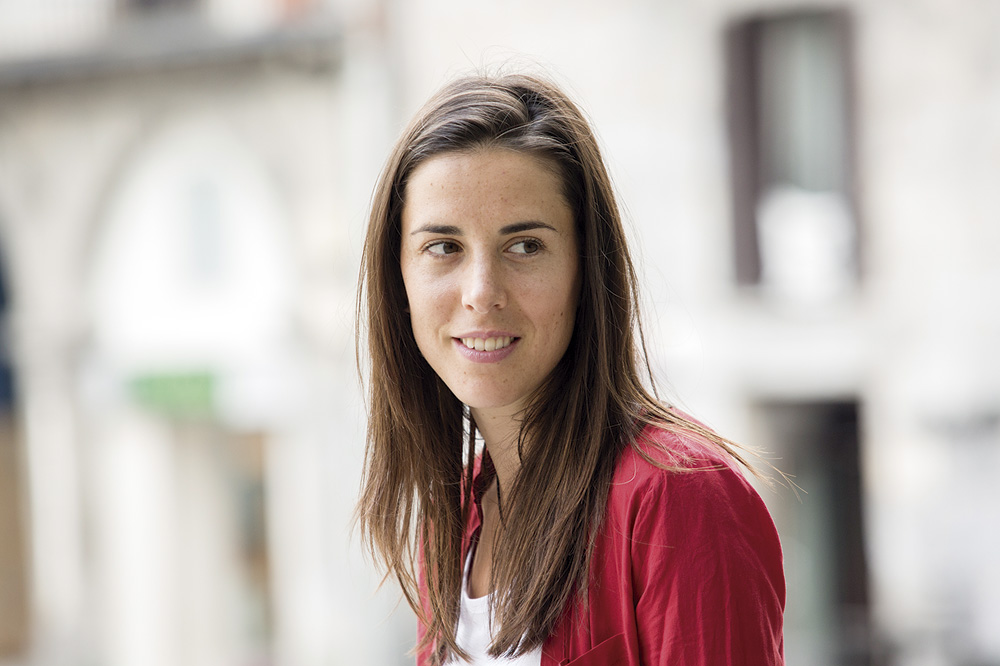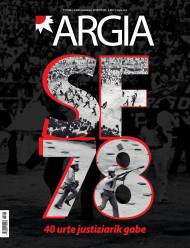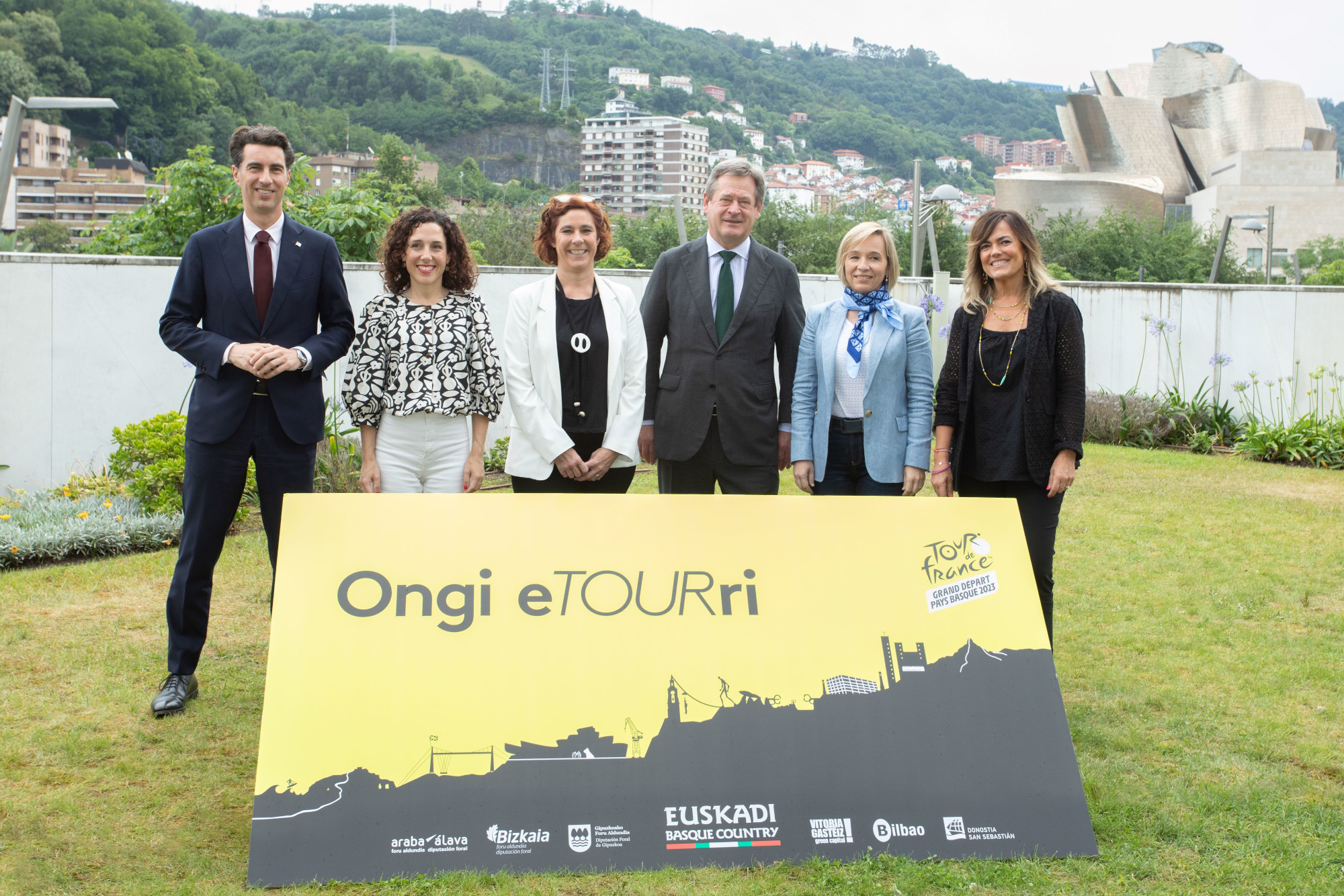"I like the kind of life of cycling"
- Collaborate in the world of cycling (soigneur). Although he is not a doctor, he is a doctor, a trainer, a caregiver… He has studied physiotherapy and sports sciences, he is dedicated to the training of high-level cyclists, in professional teams.

Fisioterapia eta Soin Hezkuntza eta Kirol Zientziak ikasketak egina. Kirolaria. Herri krosak egiten hasi zen, eta ez zen herrena. Saskibaloian jokatu zuen, eta Gipuzkoako eta Euskadiko selekzioekin jokatu zuen, eta irabazita dago Espainiako txapelketak ere. Espainiako Bi Ligan eta Espainiako maila nazionalean ere jokatuta dago Madrilgo CREF Alameda de Osuna taldean bi urtez. Txirrindularitzan dabil, soigneur lanean, bateko eta besteko taldean: Trek, Murias, Aqua Blue, Espainiako Emakumeen selekzioan… Gustuko lanean.
Basketball player, she studied Physiotherapy and Physical Education and Sport Sciences, and in 2014 she entered the world of professional cycling.
Yes. His sister Mireia Epelde was still working as a cyclist and the Spanish team masseur, Joshua Aran, was at the same time a Trek masseur. Mireia told Joshua that if one day he would lead me to a career, and so I started. I always know the world of cycling, as I was following my sister, often in the car of the team directors. The last year of studies, for its part, I did a four-month internship period, and I did it in the Trek Group. The goal was to keep track of an athlete and I went through Haimar Zubeldia. Haimar had just been operated by the wrist, and my job was not only to see the training of the cyclists, but also to do a thorough follow-up of Haimar. On the other hand, every day he had to give massages to two or three cyclists, including Haimar, watching his wrist injury heal. I was very good. It was a time of training, the atmosphere was quiet, not a serious situation in a career.
How about Haimar Zubeldia?
All right, he's a very healthy guy... I was also with Markel Irizar. Very nice too. They're very different, but they complement each other very well.
Were you in Basque?
So it is over!
He later worked at Murias Taldea for two years.
Yes, until last year. It's a contact account. The curriculum, they say, but many don't look at it. If you’ve worked well somewhere, it’s enough for someone to tell you where it’s needed: “Treken has been doing internships for four months, OK.” That was the case for Murias. They knew I did internships with Trek, I had just finished studying, Basque, physiotherapist… and they listened to me. I wanted to work in the world of cycling, I got the opportunity, and so on.
Are you passionate about cycling?
I like the cycling environment. Something that holds sport. I like to watch on TV, yes, but if I see it on TV, I prefer other sports. I like the kind of life of cycling. Surf also has that kind of life. Living here and there, nomad… Now at the moment I like that way of life. I see some of you in the world of cycling, you're a parent, or you have a family, you're over 40 years old. No, I don't see myself working on cycling at the age of 40. It seems to me a great wood, many days out, and on the outside days you work a lot, you live at the mercy of the team 24 hours a day, sleep with them, live for others 24 hours a day. You may have time to run once or twice a week. Life is hard, but I like life. It's a special life.

You are not, however, a worker of a particular group, but the owner of yourself.
Work is done in two ways: by signing an annual contract with a particular group or by days. If you work under contract, you have a fixed monthly salary, on paid holidays, a certain number of working days. It's a slightly balanced life, if you will. Today, however, it is very difficult to get a contract, as teams prefer to hire workers like us for days. Of course, they find it cheaper. They pay for days and then each one has to fix with the treasury. I just started, and I spend the day. Of course, I would love to work under contract, but in the meantime, when a group calls you and tells you: “Can you come to this race?” “Well, yes!” There may be more than one group at the same time, but the truth is that you can always work with the same team.
Now you're with Aqua Blue Sport. What careers have you done this year?
I'm with Aqua Blue, but I started the year with Caja Rural: I made the Return to Mallorca, the Star of Bessèges and the Return to Oman. Since then I started with Aqua Blue and made several classics in Belgium, Croatia, Yorkshire (England), Back to Norway, and then I had three weeks of rest. Now I'm waiting for a private tour. In the United States and in other countries, amateurs, or masters, have the habit of forming a small group and making a kind of return. They need a technical team to accompany them, including a physical therapist. Once I have done this, I will come the second part of the season, but I still don't know any of that. We do about 150 days of work a year, and I've already done many days, or quite a lot.
The enthusiast sees cycling races abroad. What do you see inside?
What a circus there is behind cycling! What I do see is how it is organized, what nomadic life we have, how many things it takes for a cyclist to do the stage on the bicycle, how much material it takes, what food, what the hours are… For example, in order to make a five-hour race, we have to do eighteen hours of work. As in many other works, what is behind the cycle race is not seen, it is not seen.
You said eighteen hours, and I do not know if you said so, for example, if we have to understand other than heat...
He got up around seven in the morning and went to bed at ten and a half or at eleven. That's our schedule. We're not working all the time, but we're working all the time on something.

as he's been at many serving points giving food and drink to the runners. The photo is given by Ainara Epelde.
What is the day's work?
We can do two types of work: hotel or career. Staff working at the hotel get up at 7 a.m., have breakfast and prepare the equipment needed by cyclists for the race: filling the bottles of drinks and food, completing the refrigerators – depending on the time the quantities of salt and water vary – preparing breakfast for cyclists, the food of the technical equipment, washing the cars inside – the mechanics clean them out – picking up all the conditions and the bags, preparing the car for the race. We got to the hotel and we got to do all the entrance. Then you have to prepare some food for the next day, like rice cake, which you have to do the day before. You also have to organize the feeding room of the cyclists, the massage room… Everything has to be prepared for the arrival of the cyclists. You also need to know what the next day’s schedule will be.
The list is long. Isn't the job done?
… Also clean the truck. And put the washing machine in -- that's what the person in charge of the hotel does. It's a lot of work, a lot of detail, but it's not a hard job. But I, instead of doing that job at the hotel, do the other, the career job. So, my job is to go in a row of cars with the race: I'm going to get out by car half an hour before the cyclists get out. I'm going to go to the sighting and the water supply point to the cyclists and then to the point of arrival. We reached the goal after five in the afternoon and from there we went to the hotel. When the cyclists finish the day, the mechanics clean and study the bikes, and we, at least three people in each group, started massaging all the cyclists. Then, have a shower and dinner. It has happened to us in Yorkshire, for example, that the last dinner at the hotel would reach us at nine, and that we would have massaged at ten. They would put us on a cold plate and we would have dinner like this. Normally, however, we come to dinner on time. It's a little late.
How many things!
It’s not a hard job, it’s a lot of small things, we have to take care of the details… That’s how our days go. They're always similar. Well, if the team has made a good stage or won the race, the massage or dinner atmosphere is different, the mood the cyclist has changes. I'm a physiotherapist, but I do the physio work in two or three hours. For the rest, I can be a psychologist, or I love, a cook and a cleaner... All the roles we do are soigneur. In a large group, we can be about ten people working as soigneur, some of us are physios, others we are massage sports…
How many women do you work in cycling?
A little bit more or less. In Acqua Blue, for example, I'm the only woman. Also in Murias. There was another one in the Trek. There were some in the Dimension Data. We are very few girls in biking. In male cycling, however, there are teams in which they want women, they say that we help balance the environment, that we calm the point of madness of men. In some groups, though, they don't want women, they say we can't work as a man.
Both in the work of the hotel and in the career, the soigneur doesn't see the race.
I do the career work, that's what I like, and I see the cyclists in two spots, in the sighting and delivery of water. I don't see another race. Ja, ja…
The amount of trash cyclists deposit around the sighting or when they reach their destination.
That's changing, like so many other things. There's a 500 meter feeding space where you can give a ration to cyclists. Then another section, 500 meters, where cyclists will throw the trash. It's something new, but that's where they are. For example, I have just come from Norway, and there, in that junk, the workers who come behind the race – among other things, the placards of the sightings and taking them off – collect the rubbish that cyclists have thrown away. In some races, there are also two garbage spots. And on the other hand, some cyclists, as they can't afford in these junk areas, also hide some waste, aluminum foil and others under the chairs.

That is also changing…
Yes, yes. That's why cyclists have also come to punish their teammates. Not only by making a hole in the car, but also by behaviors that supposedly damage the image of cycling.
In what language do they communicate?
Today, everyone knows English. With cyclists, therefore, I do so in English, without any problem. On the other hand, I also know Spanish, Italian and Basque, and I also use them with cyclists in those languages. In French, I settle a little bit. At one time, French was the official language of cycling, and today they are English and French. In local careers and translations, they first use local language and second use English. However, judges of one age continue to use French, although they are also obliged to learn English. In addition, I really like languages, and I even go nowhere, I try to say something in the local language, “thank you,” even if it’s just a “goodbye.” Try, at least.
Together with physiotherapy, studying Sports Sciences, working on professional cycling teams, what path would you like to take in the future?
I haven't thought much. Now I like this. I could have been a personal trainer, or a physical education teacher at a school, but what I most appreciate is one aspect that has given me the learning of physical education: how to see and understand sport. Physiotherapy, for its part, has taught me that I have to treat each athlete in a specific and special way, has not taught me how I have to take care of, precisely, but I do have to do it in a special way. Work will teach me everything else.
“Hemengo afizioak oso fama handia du, asko animatzen ditu ziklistak, baina Belgikakoa ere ikaragarria da. Hango klasikoak ikusi nahi, eta hiru egun lehenago joaten da jendea leku on bat hartzera. Bestalde, harrituta geratu naiz aurten, Yorkshiren ikusi dudanarekin. Harrigarria. Sekulako eguraldia egin digu, eta hura jendetza, ziklistak ikusten!”.
“Gauza ikaragarri aldatzen da herrialdetik herrialdera. Omanen, adibidez, iraintzat dute ziklistek bidoia bide bazterrera botatzea. Debekatua dute. Beste leku batzuetan, berriz, jendea anoa-gune inguruan izaten da, ziklistek botatzen dituztenak biltzen, dela bidoiak, poltsak, energia-barratxoak… Edozer gauza!”.
“Egunka lanean ari naiz, eta ez dakit zer izango den hurrengo urtean, baina ezta hemendik lau hilabetera non ibiliko naizen ere. Oraindik orain, Ramontxu Gonzalez Arrietak hots egin dit, Espainiako emakumezko ziklisten taldearekin Europako txapelketara joateko”.





















